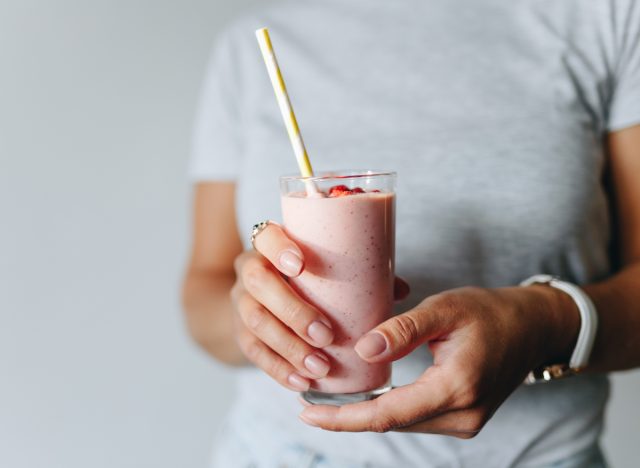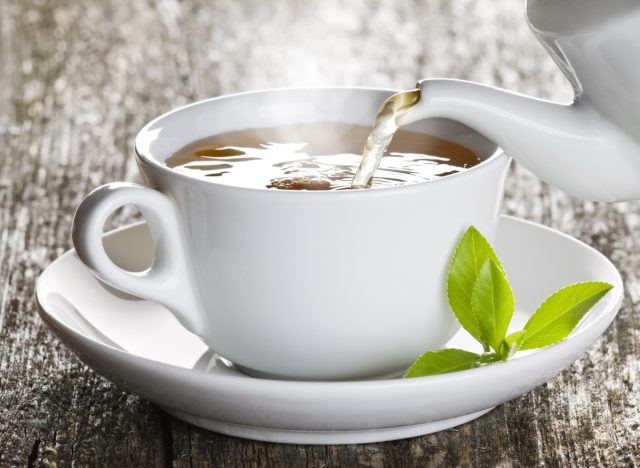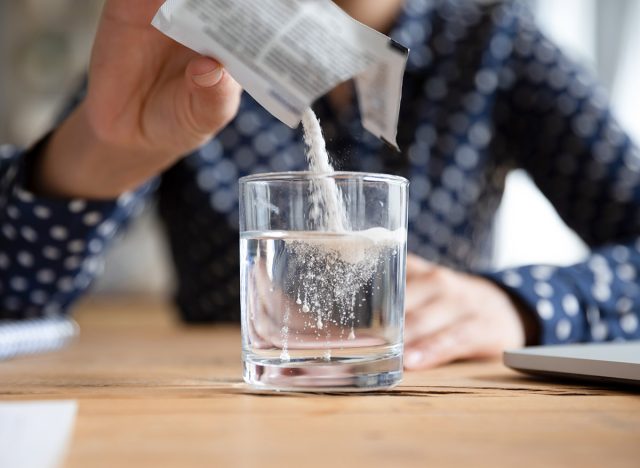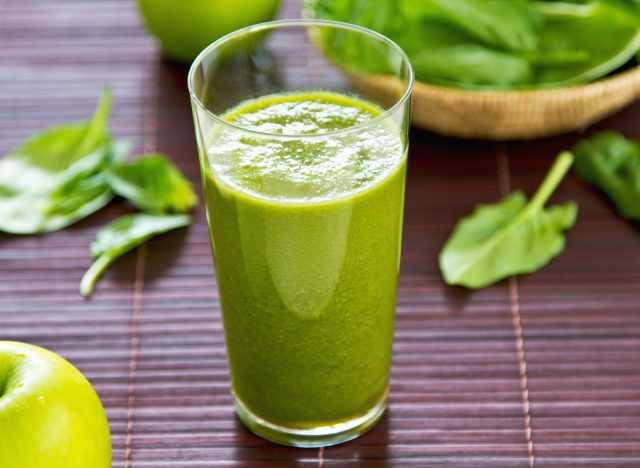5 Best Drinks for Heart Disease, Say Dietitians

Heart disease is an umbrella term that encompasses several different types of heart conditions, like coronary artery disease, arrhythmia, and atherosclerosis. According to the Centers for Disease Control and Prevention (CDC), "heart disease is the leading cause of death for men, women, and people of most racial and ethnic groups in the United States."
While there are non-modifiable genetic factors contributing to your heart health, there are plenty of lifestyle factors that play significant roles in your well-being. Exercise, weight, smoking status, and what you eat and drink can influence your health.
When considering how proper nutrition can help your heart, you may atomically think about healthy foods, like salmon and avocado, and while these contain heart-healthy fats, the beverages you have can play a role, too. Here are the best drinks for reducing your risk of heart disease.
Smoothie

Fruits and veggies are packed with potassium, an electrolyte that can reduce pressure on your blood vessel walls, supporting overall heart and vessel health. Additionally, potassium counters the negative effects sodium can have on your blood pressure, helping to reduce your risk of hypertension, a major risk factor for heart disease. Many fruits contain potassium, but the ones that are the most concentrated are bananas, oranges, cantaloupe, honeydew, and grapefruit.
Make a tropical smoothie at home with banana, pineapple, and citrus slices, a handful of spinach, or some avocado or beets for an added potassium boost. Make sure you limit added refined sugar in your smoothie, like that from juice, as this form of sugar can negatively impact your heart health.
Water

It may not be the most exciting drink on this list, but plain ol' water can do wonders for your heart health. When you are well hydrated, your heart can pump blood through your body more efficiently, which can reduce the amount of strain put on your cardiovascular system. While all fluids can contribute to your overall hydration, you should aim for the majority of your total fluid intake to come from plain water.
Other beverages that can contribute to your hydration are more likely to contain added sugar, like soda, juice, and sweetened tea, which we know can detract from heart health. Other common drinks, like coffee and energy drinks, contain caffeine that may exacerbate heart issues for some and are therefore not the best source of hydration.
Each of our fluid needs varies based on several factors, like activity and natural sweat rate; however, a good rule of thumb is women should consume at least 80-ounces of fluid per day and men should reach 110-ounces per day, at least half coming from plain water.
Tea

A nice soothing cup of tea in the evening is a ritual for many, and for good reason. Herbal teas, like chamomile and lavender, are thought to be a holistic way to improve sleep quality. You may be wondering what this has to do with your heart health. Inadequate sleep appears to be a risk factor for heart disease as it has the potential to increase the incidence of high blood pressure, obesity, and diabetes, which can all raise your risk for heart disease. Current data suggests most adults need 7 to 9 hours of sleep per night, and good sleep hygiene is important in reaching that range.
A non-caffeinated cup of herbal tea before bed, limiting screen time in the evening and a comfortable sleep environment are all factors that will influence your sleep duration and quality. In addition to the sleepy properties tea may induce, this drink also contains antioxidants that support your overall health.
Fiber supplement

You may associate fiber with roughage, like that from vegetables and whole grains, but you can also boost your fiber intake through your beverages! The smoothie above is a great start to boosting your fiber intake, and a single smoothie that contains a few cups of fruits and veggies can provide more than 5 grams of fiber in one drink! However, if you struggle to get enough fiber elsewhere in your diet, a fiber supplement added to a glass of water may be a good idea.
Most powdered fiber supplements contain soluble fiber, the form that is best for aiding in heart health. While fruits, veggies, and whole grains contain small amounts of this type of fiber, a daily fiber supplement will help ensure you get the 6 to 8 grams of soluble fiber recommended each day for adults. Soluble fiber can reduce the absorption of cholesterol in your bloodstream, potentially reducing the amount of unhealthy LDL cholesterol you have in your body and reducing your risk for atherosclerosis.
Green juice

Whether you make yours fresh at home, buy bottled from a store, or mix a powdered green supplement into the water, each form of green juice can benefit your heart health. Green juice is packed with so many nutrients, like potassium, antioxidants, and even anti-inflammatory factors. This combination of nutrients can benefit your overall health, including your heart, and is a simple addition to your day.
In fact, one study observed the benefits of drinking daily kale juice and found this drink can positively influence blood markers, and even reduce the risk of coronary artery disease in males with hyperlipidemia. When considering adding green juice to your regimen, it is important to again avoid options that have added sugar, and instead choose those made strictly from fruits and veggies, or powdered supplements that do not list "sugar" as an ingredient.
Your heart is the most important muscle in your body, and keeping it healthy with your beverage choices is essential. In addition to using these drinks listed to reduce your risk for heart disease, also monitor your alcohol intake, limit added sugar in your drinks, and consult with your doctor on appropriate caffeine consumption.








